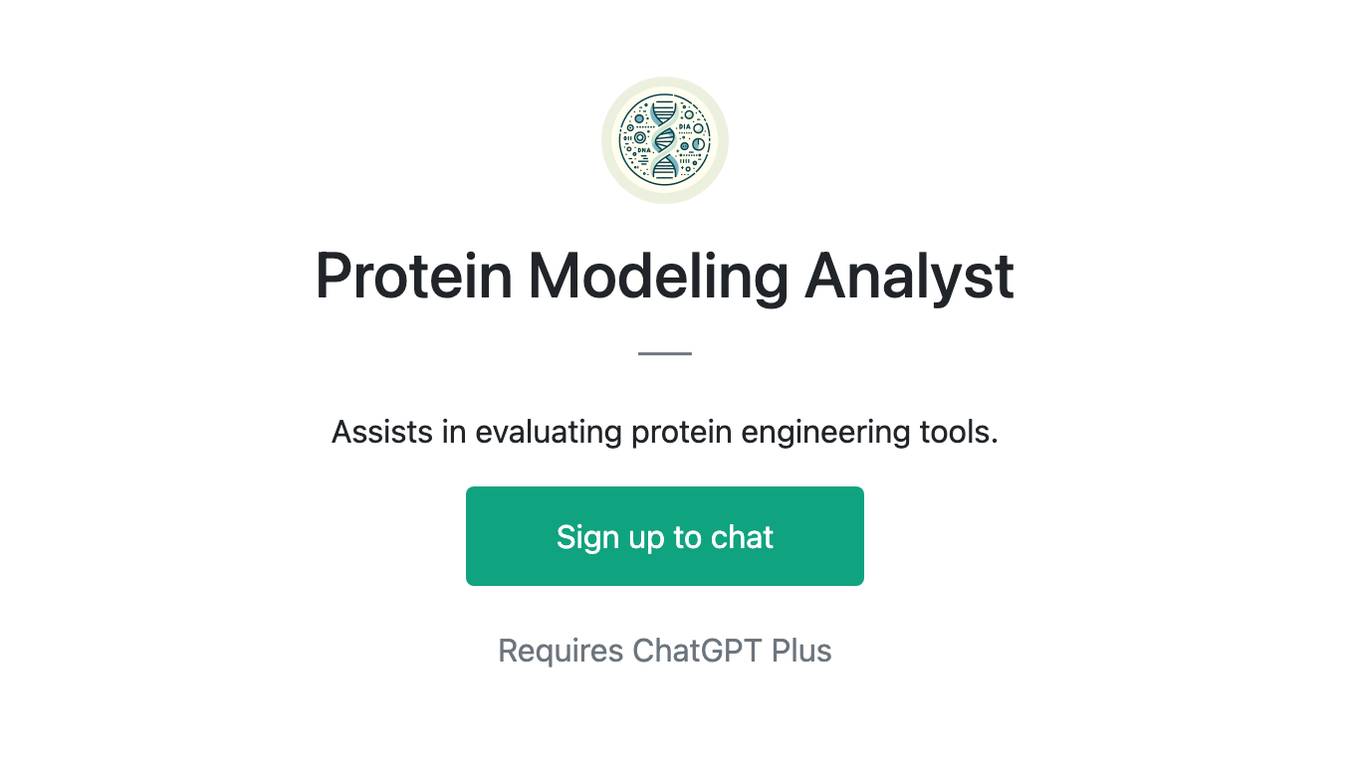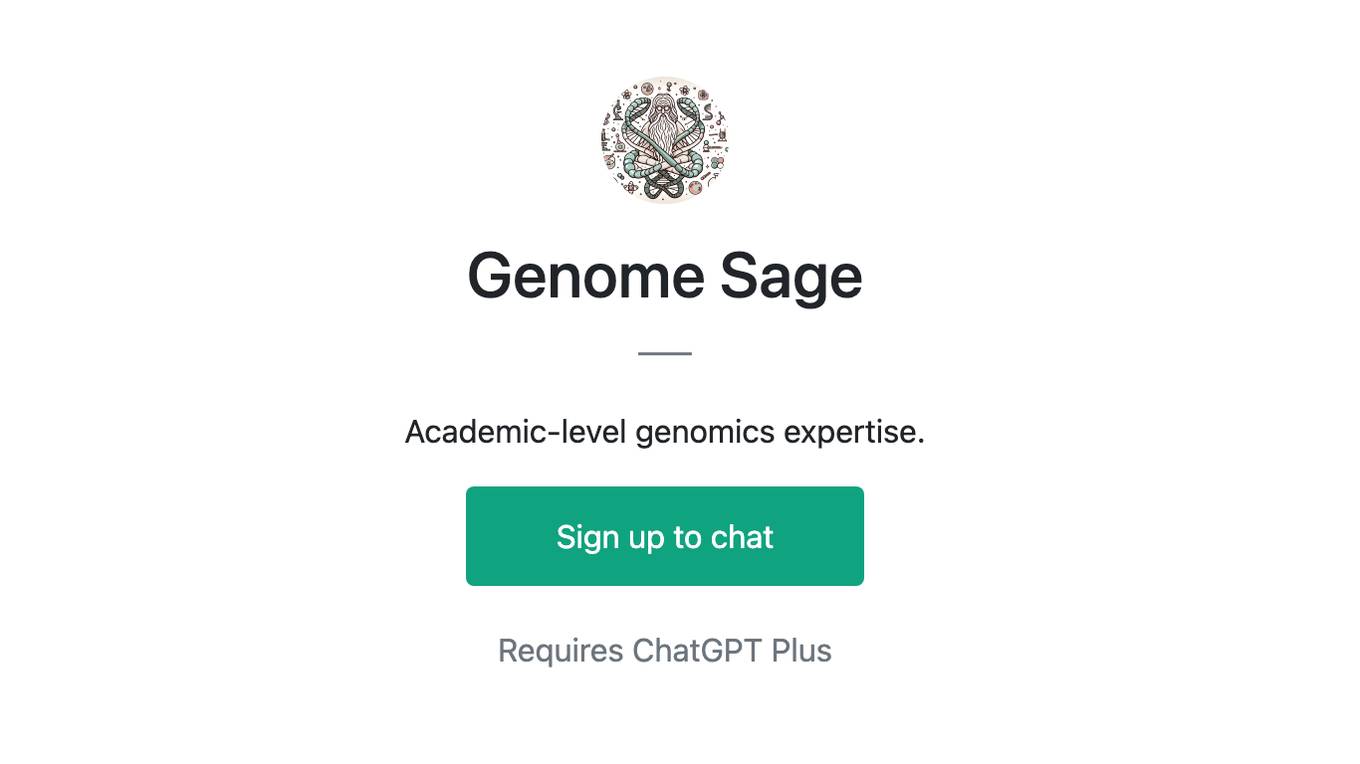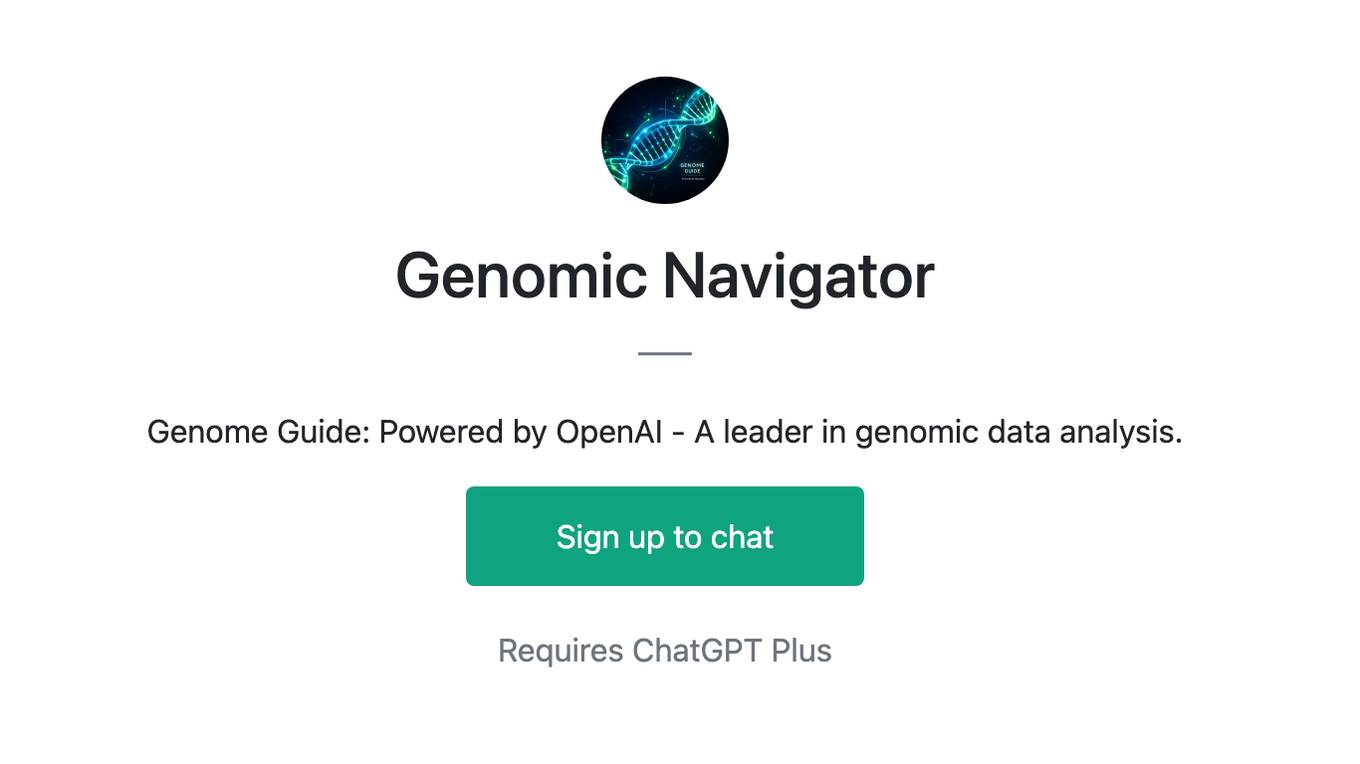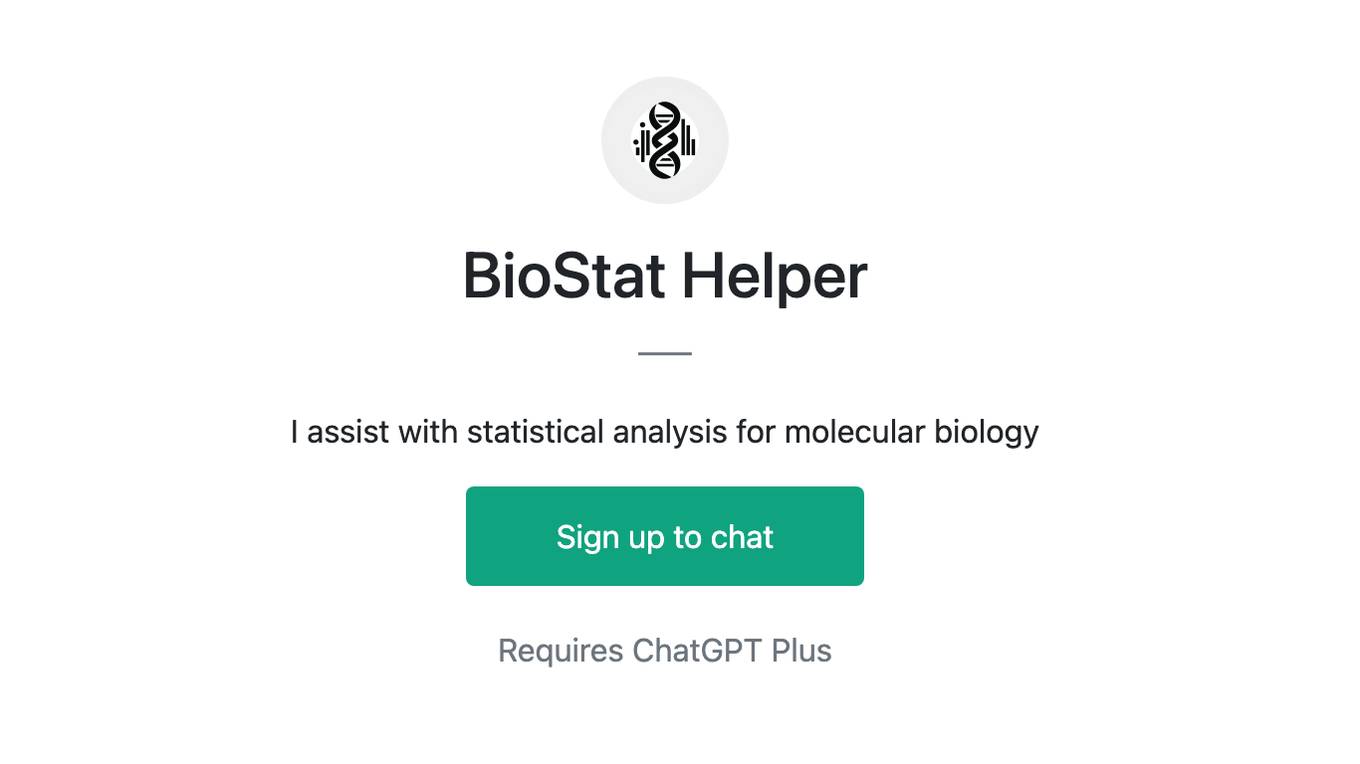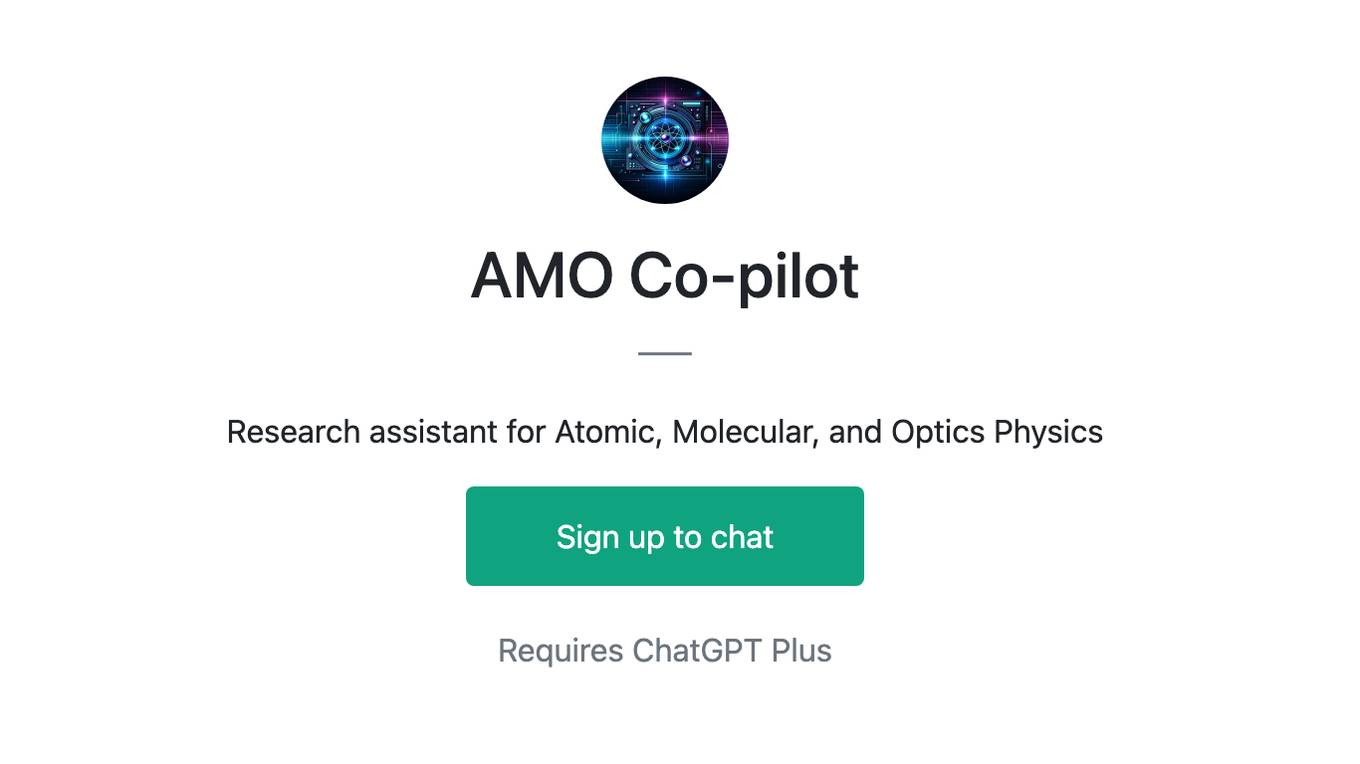Best AI tools for< Molecular Biologist >
Infographic
16 - AI tool Sites
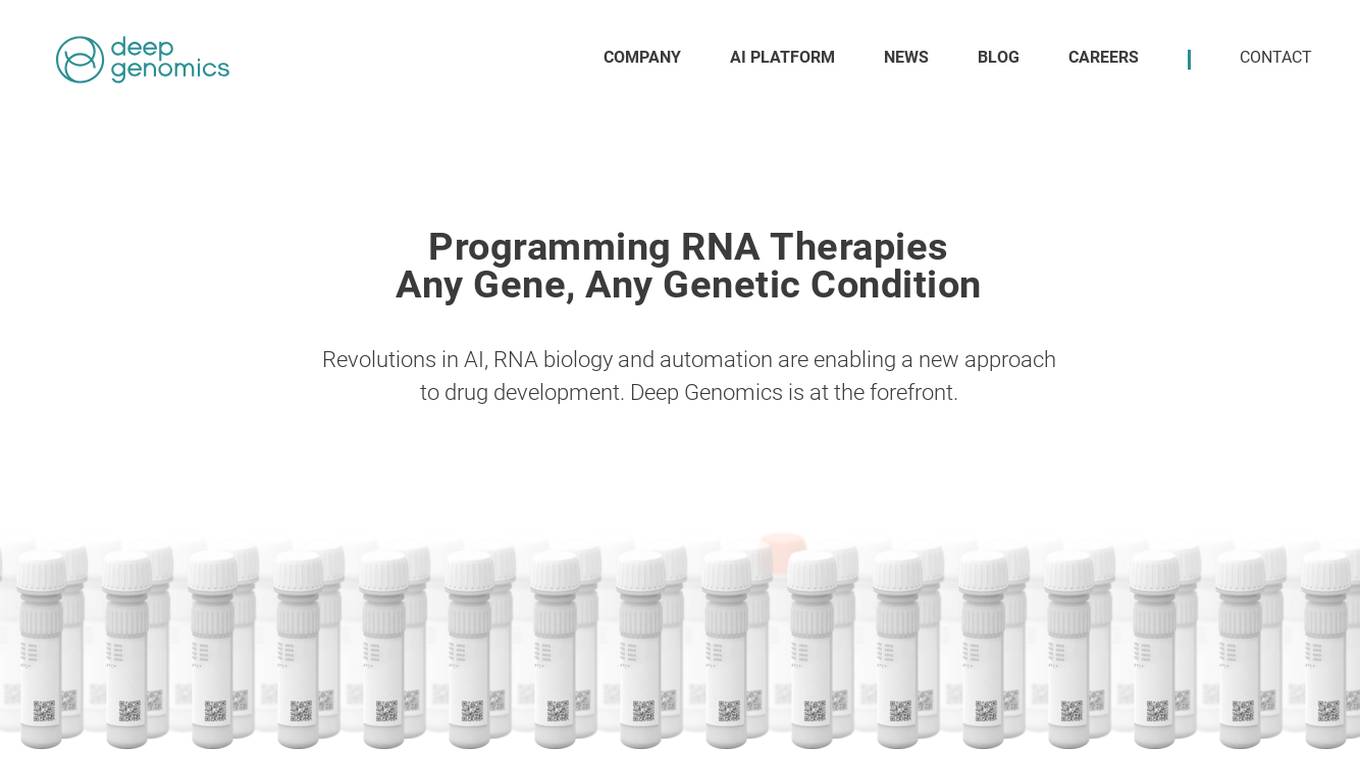
Deep Genomics
Deep Genomics is a company that uses artificial intelligence (AI) to develop RNA therapies for genetic diseases. The company's AI platform is designed to identify novel targets and evaluate thousands of possibilities to identify the best therapeutic candidates. Deep Genomics is currently developing BigRNA+, which will expand the number of mechanisms and genetic variants the company can pursue.

Allchemy
Allchemy is a resource-aware AI platform for drug discovery. It combines state-of-the-art computational synthesis with AI algorithms to predict molecular properties. Within minutes, Allchemy creates thousands of synthesizable lead candidates meeting user-defined profiles of drug-likeness, affinity towards specific proteins, toxicity, and a range of other physical-chemical measures. Allchemy encompasses the entire resource-to-drug design process and has been used in academic, corporate and classified environments worldwide to: Design synthesizable leads targeting specific proteins Evolve scaffolds similar to desired drugs Design “circular” drug syntheses from renewable materials Interface with and instruct automated synthesis platforms and optimize pilot-scale processes Operate “iterative synthesis” schemes Predict side reactions and create forensic “synthetic signatures” of hazardous/toxic molecules Design synthetic degradation and recovery cycles for various types of feedstocks and functional target molecules
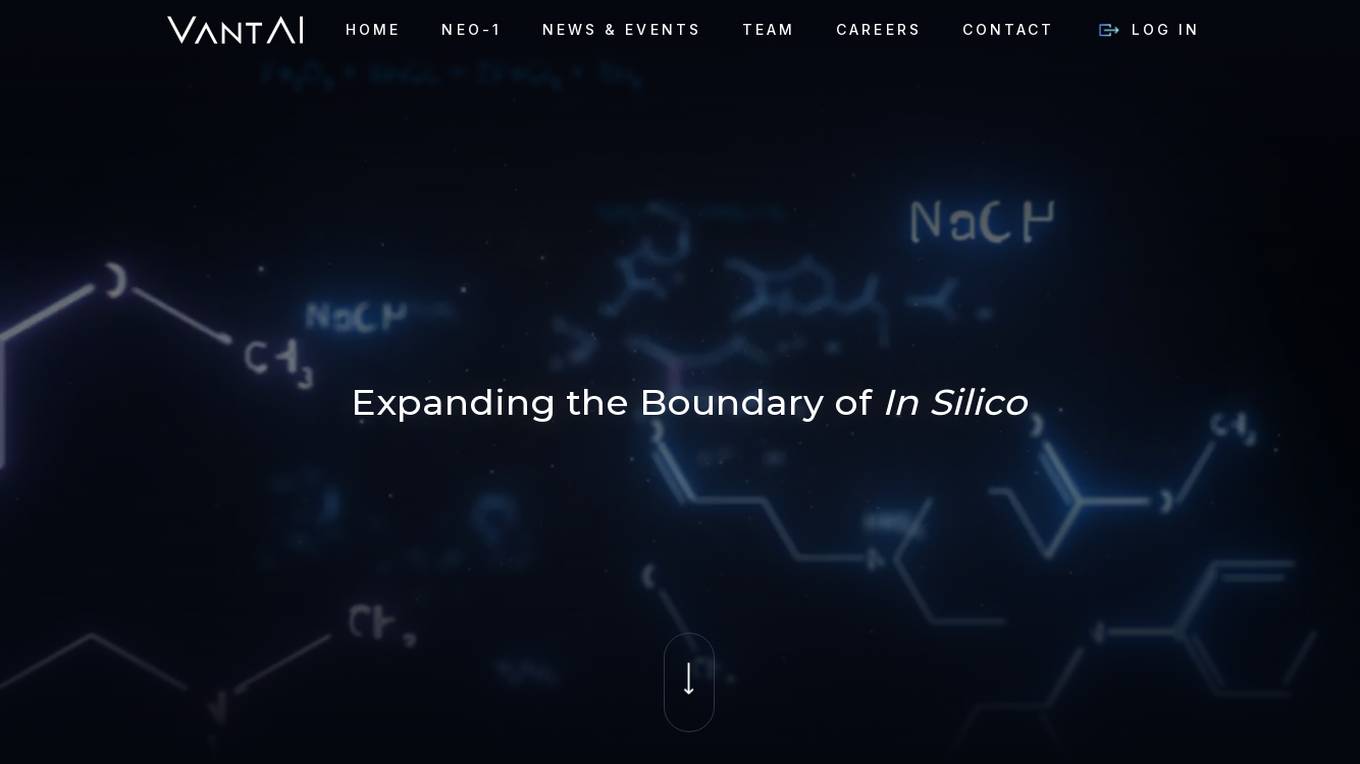
VantAI
VantAI is an AI application focused on generative AI-enabled drug discovery. Their mission is to unlock a new chapter in medicine by making protein interactions programmable. They have an integrated discovery platform with phase-shifting technologies designed to unlock the full potential of the proximity modulator modality. VantAI collaborates with industry leaders to build the future of therapeutic design. The company has launched Neo-1, the first AI model to rewire molecular interactions by unifying structure prediction and generation.
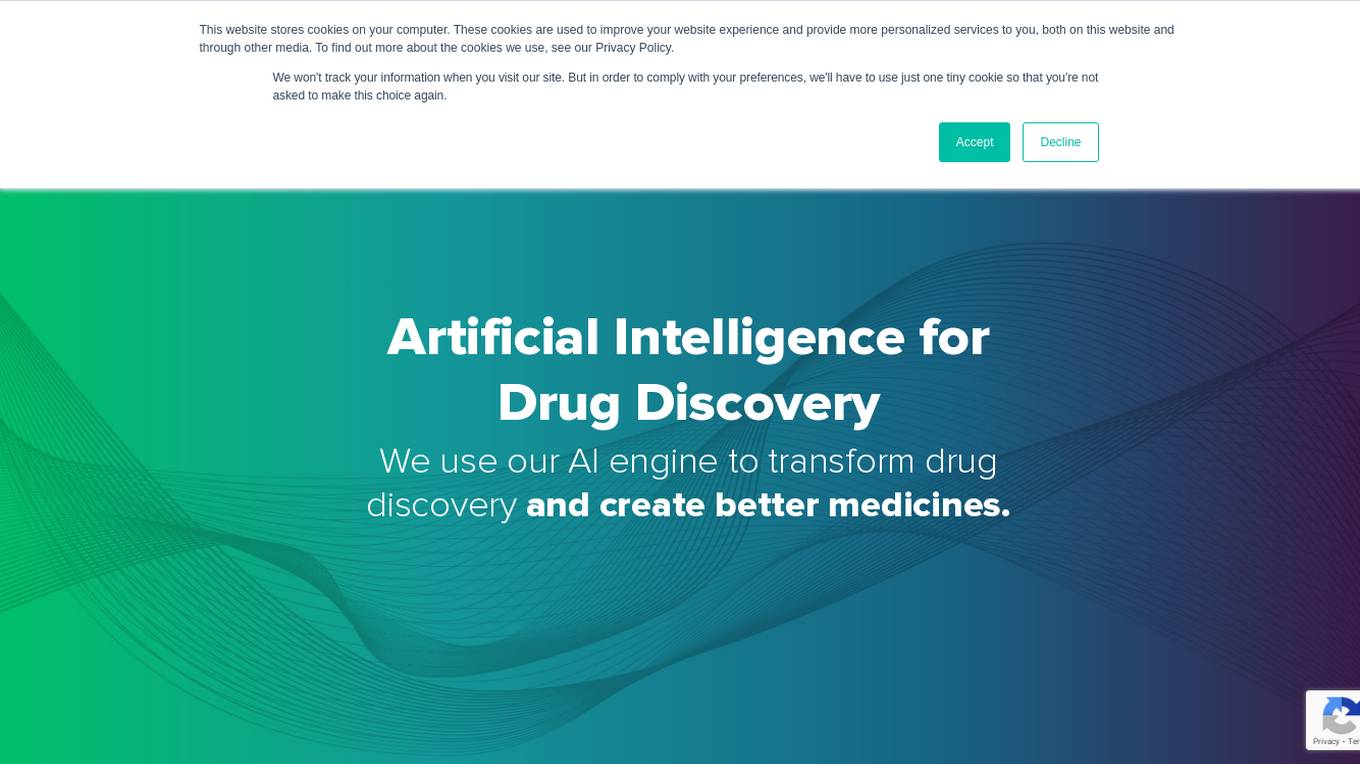
Atomwise
Atomwise is an artificial intelligence (AI)-driven drug discovery company that uses machine learning to discover and develop new small molecule medicines. The company's AI engine combines the power of convolutional neural networks with massive chemical libraries to identify new drug candidates. Atomwise has a wholly owned pipeline of drug discovery programs and also partners with other pharmaceutical companies to co-develop drugs. The company's investors include prominent venture capital firms and pharmaceutical companies.
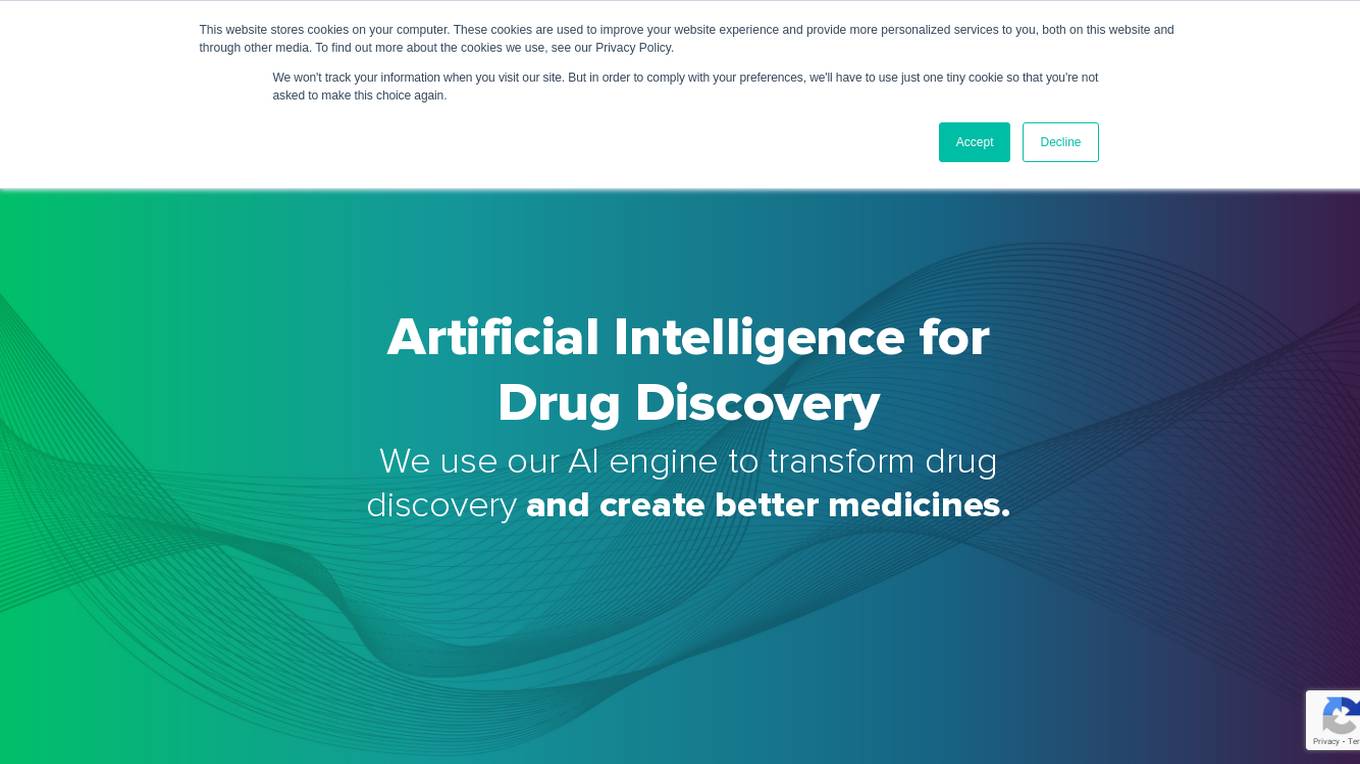
Atomwise
Atomwise is an AI-powered drug discovery company that uses machine learning to identify new small molecule medicines. The company's platform combines the power of convolutional neural networks with massive chemical libraries to discover new drug candidates. Atomwise has a portfolio of wholly owned and co-developed pipeline assets, and is backed by prominent investors.
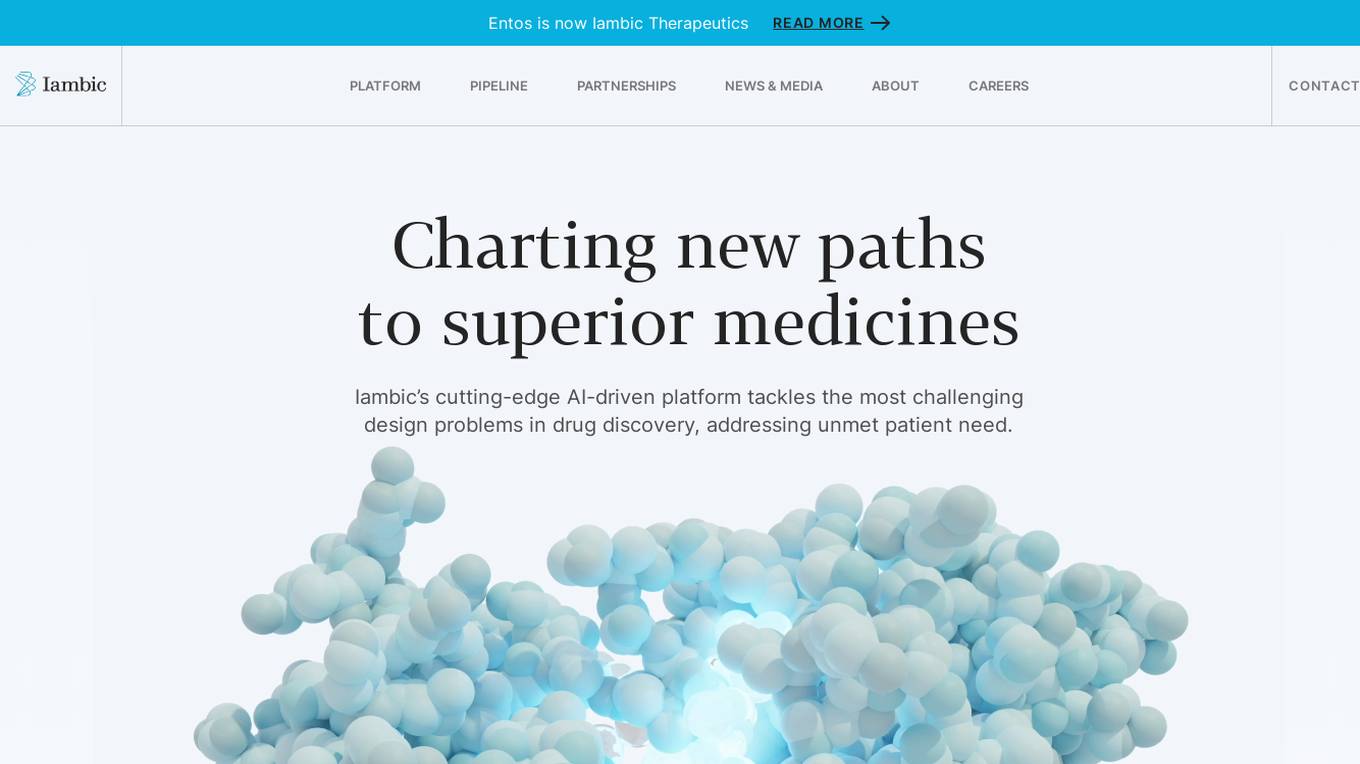
Iambic Therapeutics
Iambic Therapeutics is a cutting-edge AI-driven drug discovery platform that tackles the most challenging design problems in drug discovery, addressing unmet patient need. Its physics-based AI algorithms drive a high-throughput experimental platform, converting new molecular designs to new biological insights each week. Iambic's platform optimizes target product profiles, exploring multiple profiles in parallel to ensure that molecules are designed to solve the right problems in disease biology. It also optimizes drug candidates, deeply exploring chemical space to reveal novel mechanisms of action and deliver diverse high-quality leads.
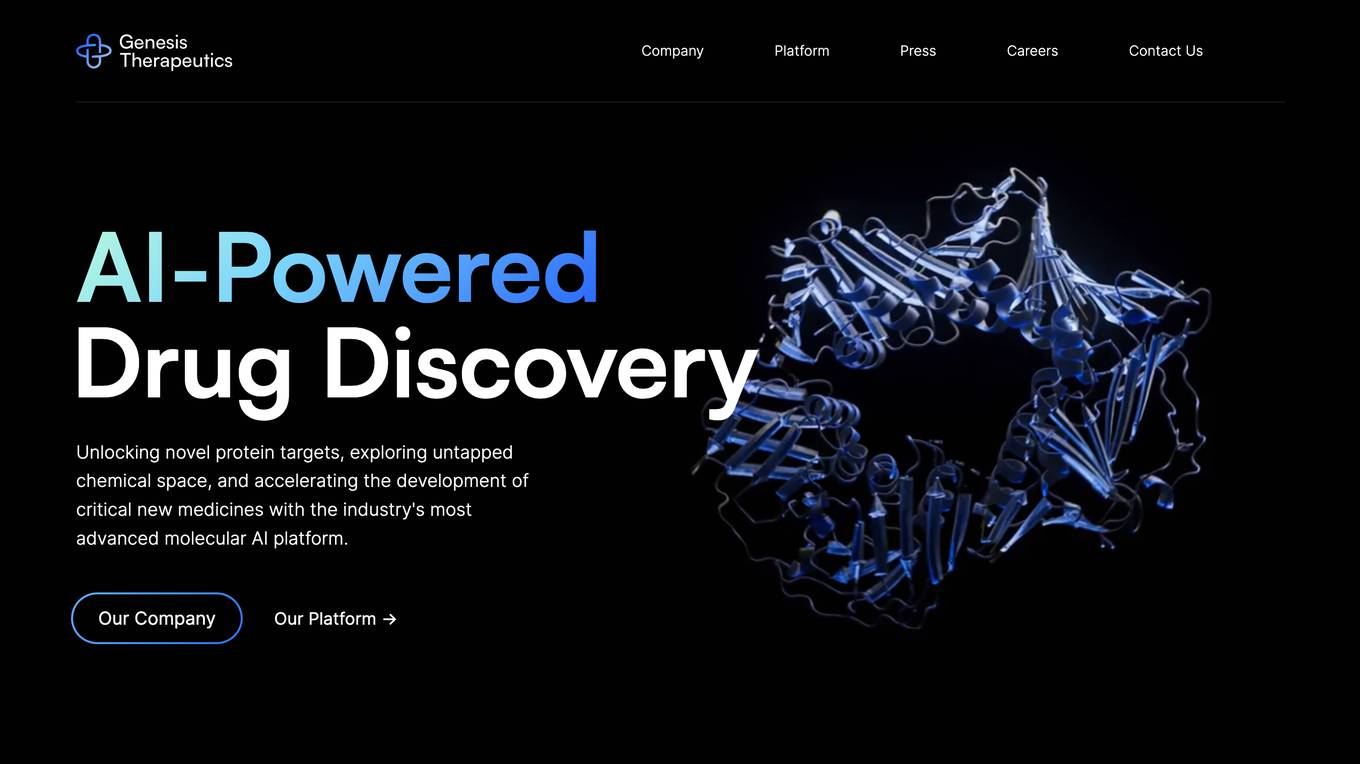
Genesis Molecular AI
Genesis Molecular AI is a pioneering molecular AI platform that builds and deploys GEMS, the AI Operating System for drug discovery. Their platform, including the model Pearl, empowers scientists to unlock tough protein targets and invent medicines with unprecedented potency and selectivity. Genesis combines AI and physics research to create a state-of-the-art platform for drug discovery, providing highly potent and selective drugs to address chemically complex targets. The company's success is attributed to a collaborative mix of minds across AI and biotech, working in iterative, interdisciplinary loops to discover and develop drugs for challenging targets.
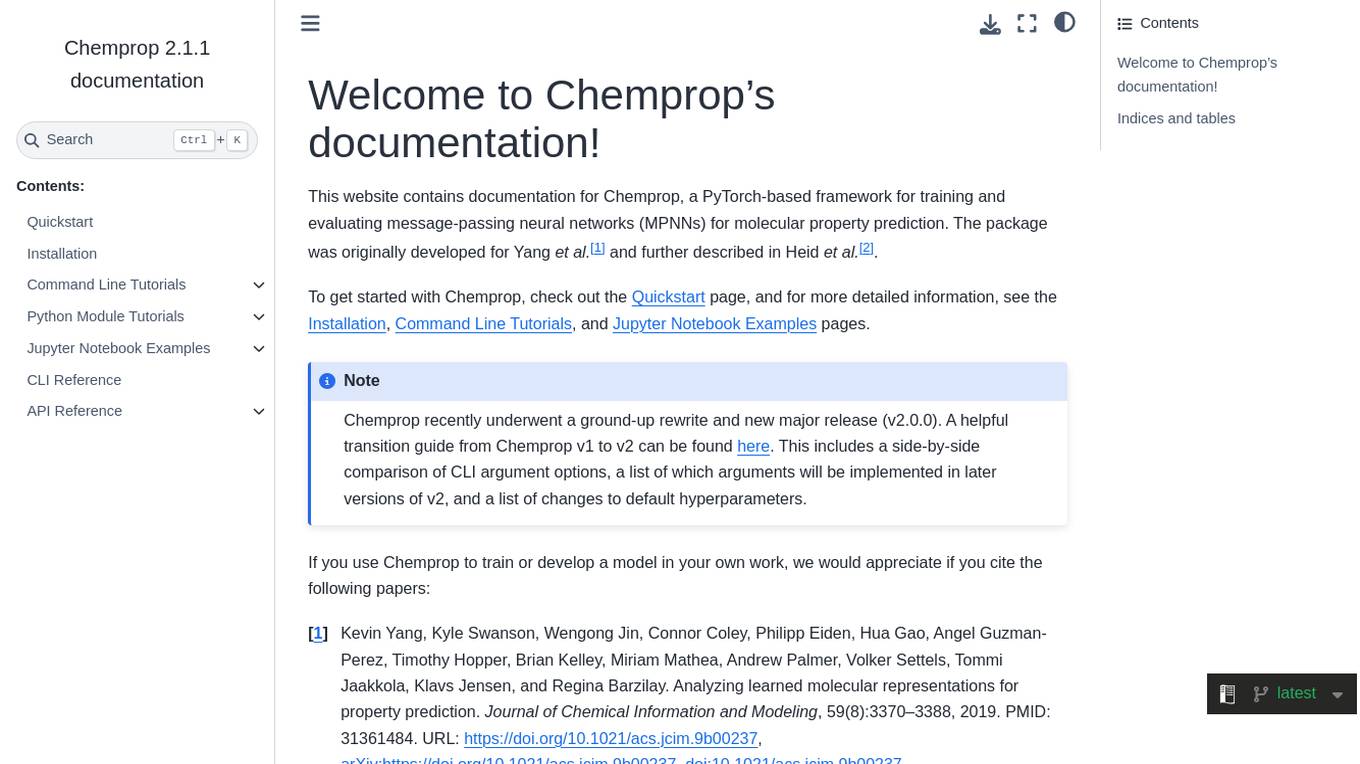
Chemprop
Chemprop is a PyTorch-based framework for training and evaluating message-passing neural networks (MPNNs) for molecular property prediction. Originally developed for research purposes, Chemprop offers a comprehensive set of tools and features for training models and analyzing molecular representations. The package underwent a recent major release (v2.0.0) with significant improvements and updates.
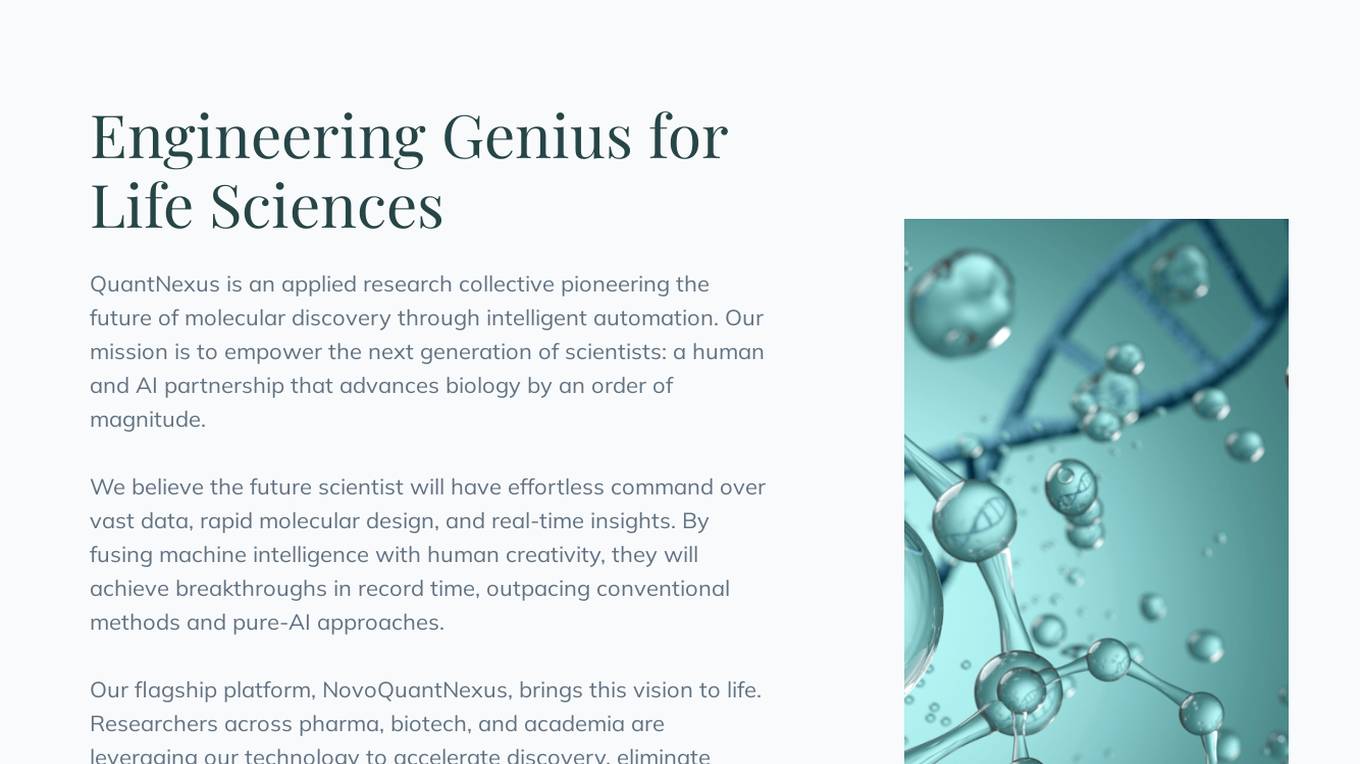
QuantNexus
QuantNexus is an applied research collective that pioneers the future of molecular discovery through intelligent automation. Their mission is to empower the next generation of scientists by creating a human and AI partnership that advances biology significantly. The platform, NovoQuantNexus, fuses machine intelligence with human creativity to achieve breakthroughs in record time, outpacing conventional methods and pure-AI approaches. Researchers in pharma, biotech, and academia are leveraging this technology to accelerate discovery and redefine possibilities in life sciences.

Tempus
Tempus is an AI-enabled precision medicine company that brings the power of data and artificial intelligence to healthcare. With the power of AI, Tempus accelerates the discovery of novel targets, predicts the effectiveness of treatments, identifies potentially life-saving clinical trials, and diagnoses multiple diseases earlier. Tempus's innovative technology includes ONE, an AI-enabled clinical assistant; NEXT, a tool to identify and close gaps in care; LENS, a platform to find, access, and analyze multimodal real-world data; and ALGOS, algorithmic models connected to Tempus's assays to provide additional insight.
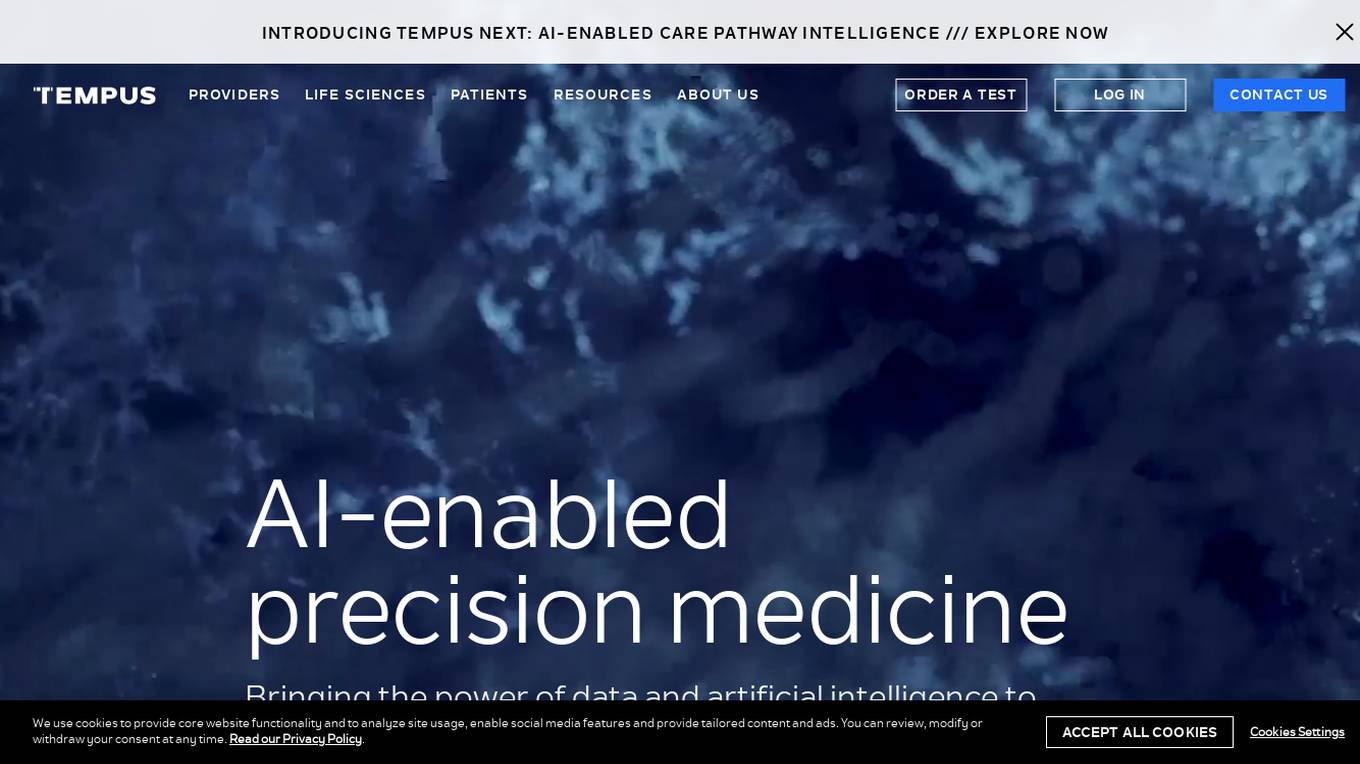
Tempus
Tempus is an AI-enabled precision medicine company that brings the power of data and artificial intelligence to healthcare. With the power of AI, Tempus accelerates the discovery of novel targets, predicts the effectiveness of treatments, identifies potentially life-saving clinical trials, and diagnoses multiple diseases earlier. Tempus' innovative technology includes ONE, an AI-enabled clinical assistant; NEXT, which identifies and closes gaps in care; LENS, which finds, accesses, and analyzes multimodal real-world data; and ALGOS, algorithmic models connected to Tempus' assays to provide additional insight.

HUAWEI Cloud Pangu Drug Molecule Model
HUAWEI Cloud Pangu is an AI tool designed for accelerating drug discovery by optimizing drug molecules. It offers features such as Molecule Search, Molecule Optimizer, and Pocket Molecule Design. Users can submit molecules for optimization and view historical optimization results. The tool is based on the MindSpore framework and has been visited over 300,000 times since August 23, 2021.
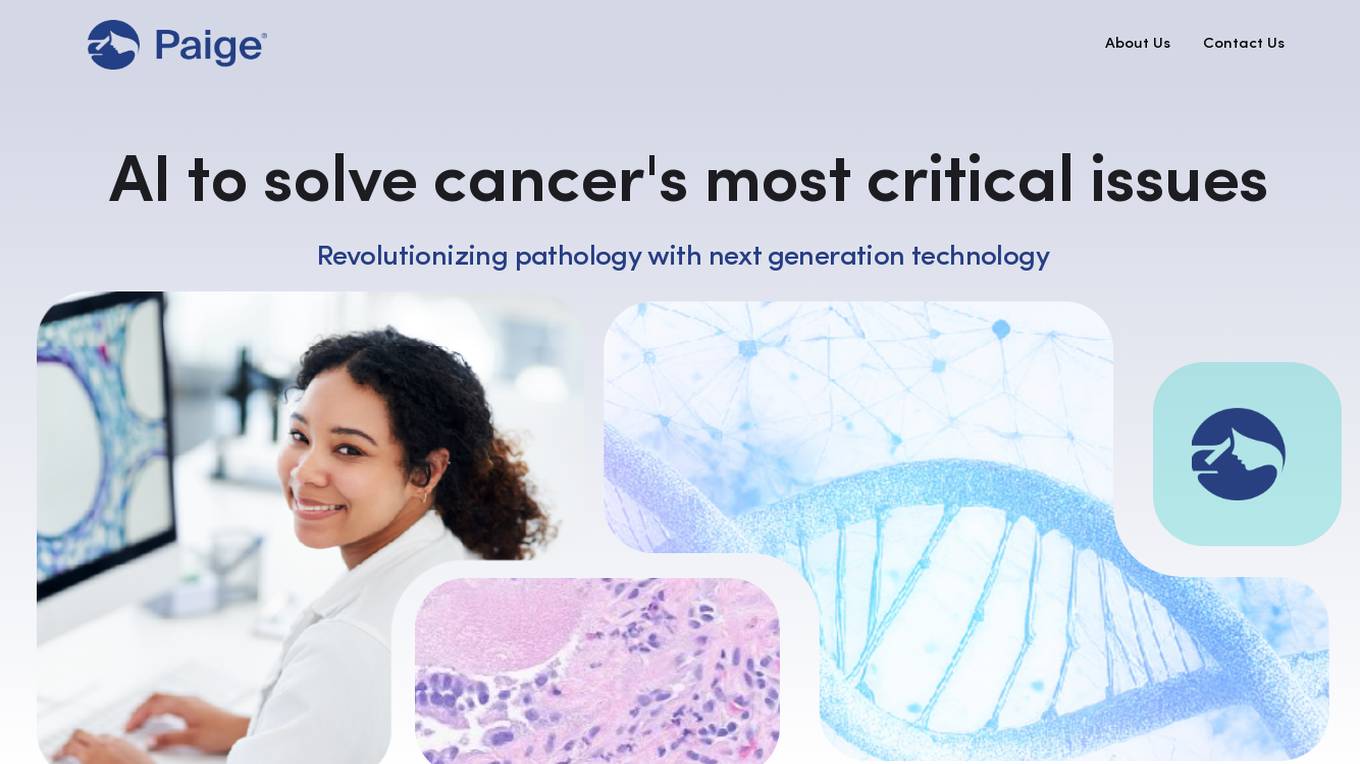
Paige AI
Paige is a leading AI company revolutionizing pathology with next-generation technology. They provide diagnostic and biomarker AI, predictive analytics technology, and AI-assisted applications to support cancer detection, subtyping, and molecular biomarker discovery from tissue samples. Paige offers a range of AI suites for prostate, breast, colon, and PanCancer, as well as the innovative Paige Alba™ multi-modal co-pilot. Their advanced AI technology and services help streamline AI development, optimize existing applications, and drive groundbreaking advancements in cancer care.

BugFree.ai
BugFree.ai is an AI-powered platform designed to help users practice system design and behavior interviews, similar to Leetcode. The platform offers a range of features to assist users in preparing for technical interviews, including mock interviews, real-time feedback, and personalized study plans. With BugFree.ai, users can improve their problem-solving skills and gain confidence in tackling complex interview questions.
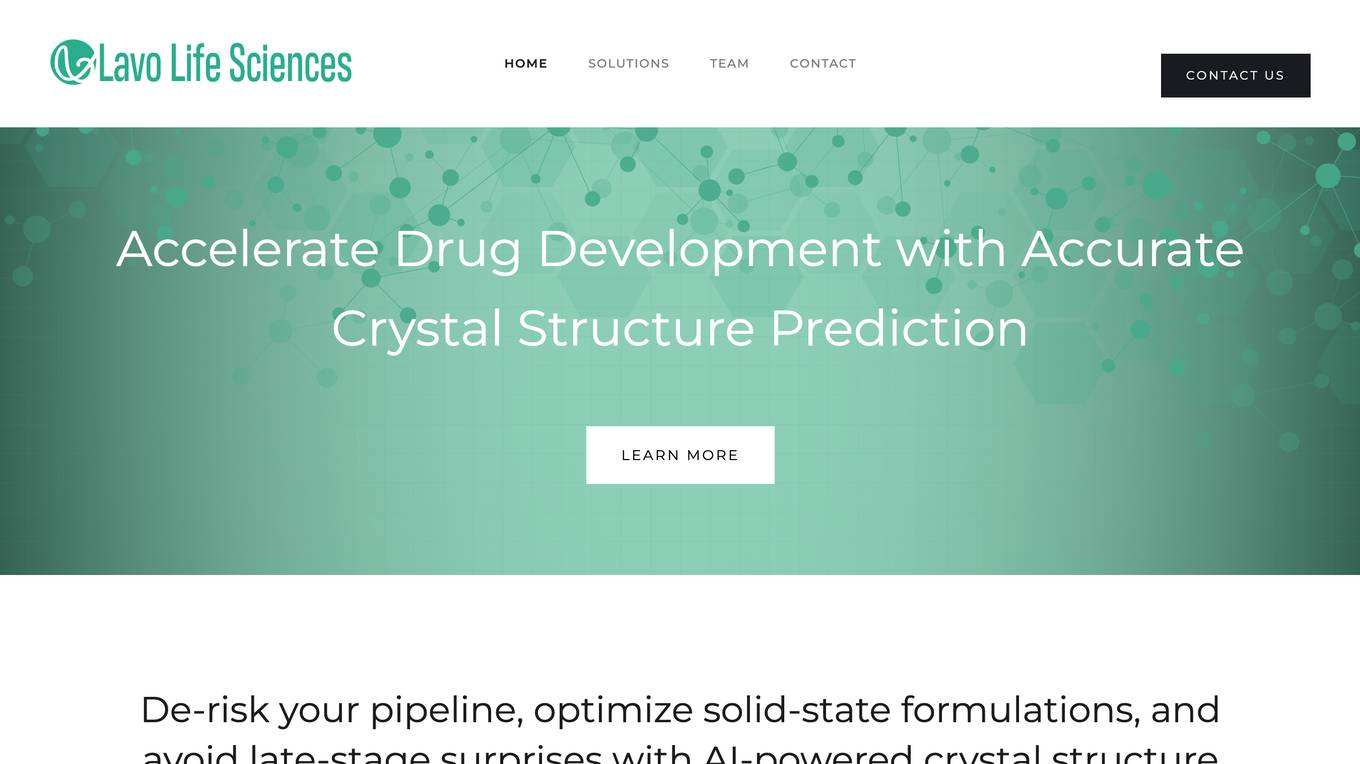
Lavo Life Sciences
Lavo Life Sciences is an AI-accelerated crystal structure prediction application that helps in drug development by providing accurate predictions for small molecule drugs. The application utilizes AI technology to optimize solid-state formulations, reduce turnaround time, mitigate risks, and discover novel polymorphs, ultimately streamlining the pharmaceutical research and development process.
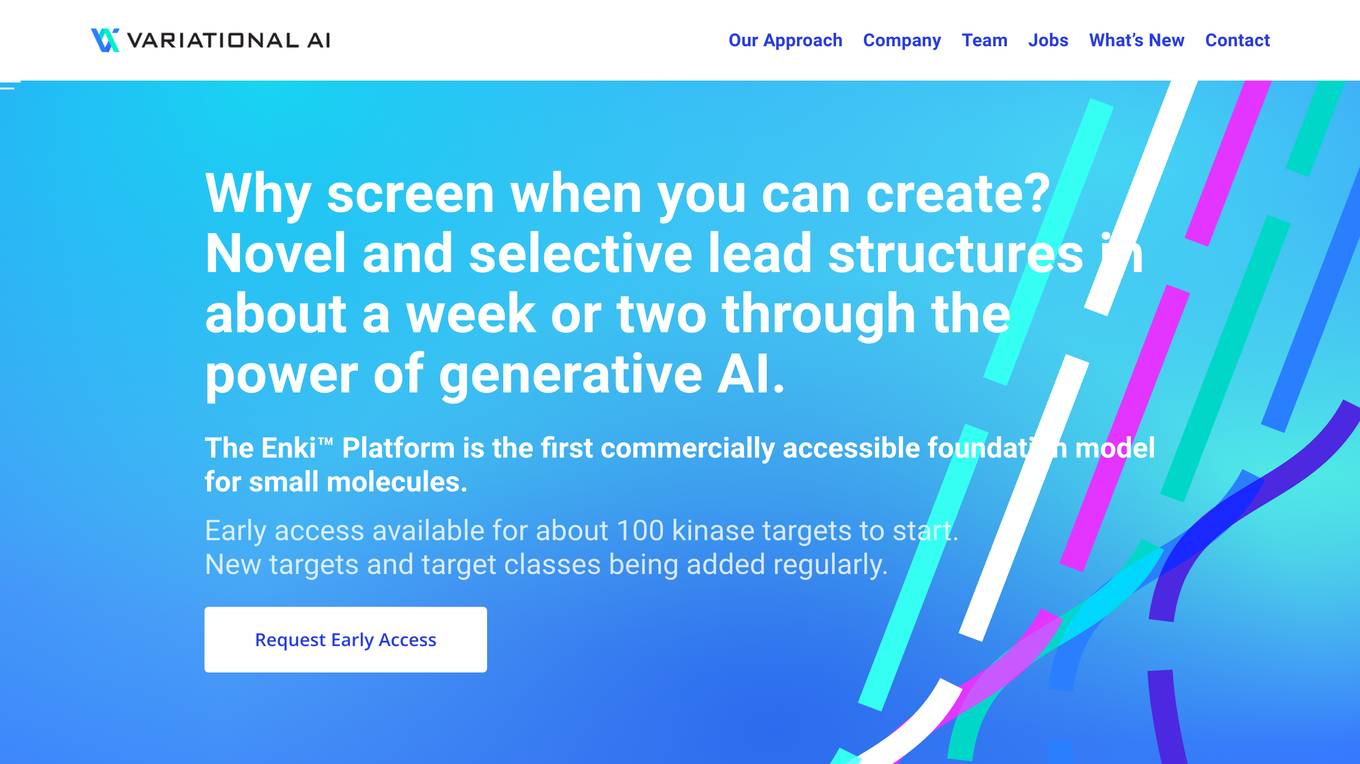
Variational AI
Variational AI is a company that uses generative AI to discover novel drug-like small molecules with optimized properties for defined targets. Their platform, Enki™, is the first commercially accessible foundation model for small molecules. It is designed to make generating novel molecule structures easy, with no data required. Users simply define their target product profile (TPP) and Enki does the rest. Enki is an ensemble of generative algorithms trained on decades worth of experimental data with proven results. The company was founded in September 2019 and is based in Vancouver, BC, Canada.
3 - Open Source Tools
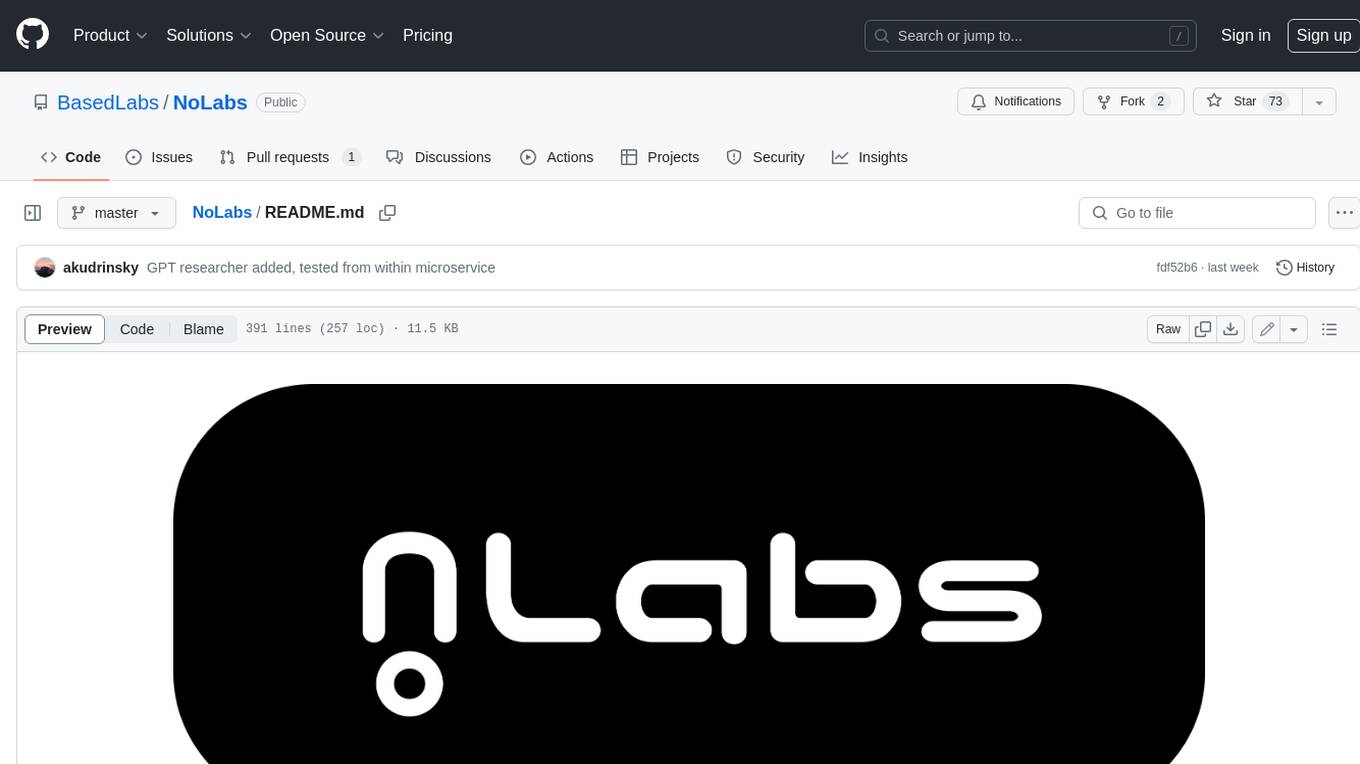
NoLabs
NoLabs is an open-source biolab that provides easy access to state-of-the-art models for bio research. It supports various tasks, including drug discovery, protein analysis, and small molecule design. NoLabs aims to accelerate bio research by making inference models accessible to everyone.
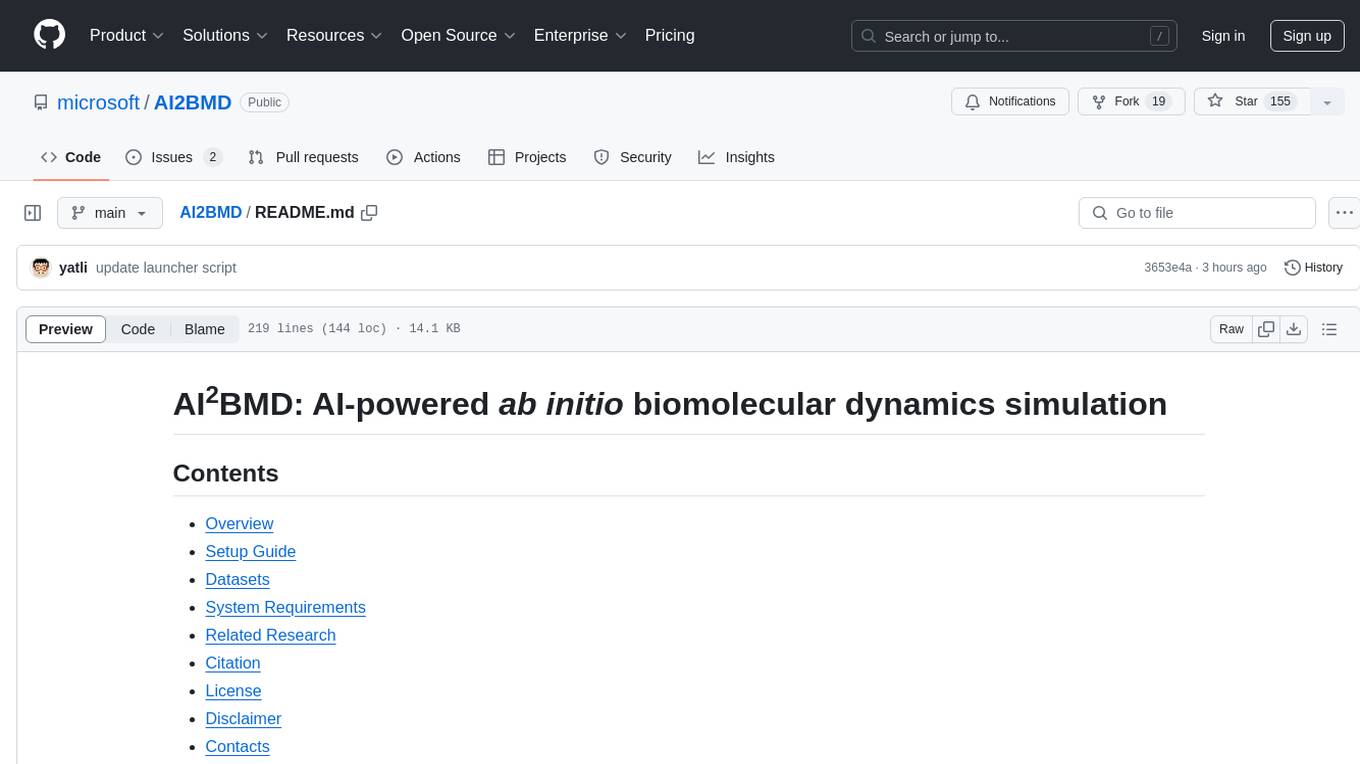
AI2BMD
AI2BMD is a program for efficiently simulating protein molecular dynamics with ab initio accuracy. The repository contains datasets, simulation programs, and public materials related to AI2BMD. It provides a Docker image for easy deployment and a standalone launcher program. Users can run simulations by downloading the launcher script and specifying simulation parameters. The repository also includes ready-to-use protein structures for testing. AI2BMD is designed for x86-64 GNU/Linux systems with recommended hardware specifications. The related research includes model architectures like ViSNet, Geoformer, and fine-grained force metrics for MLFF. Citation information and contact details for the AI2BMD Team are provided.
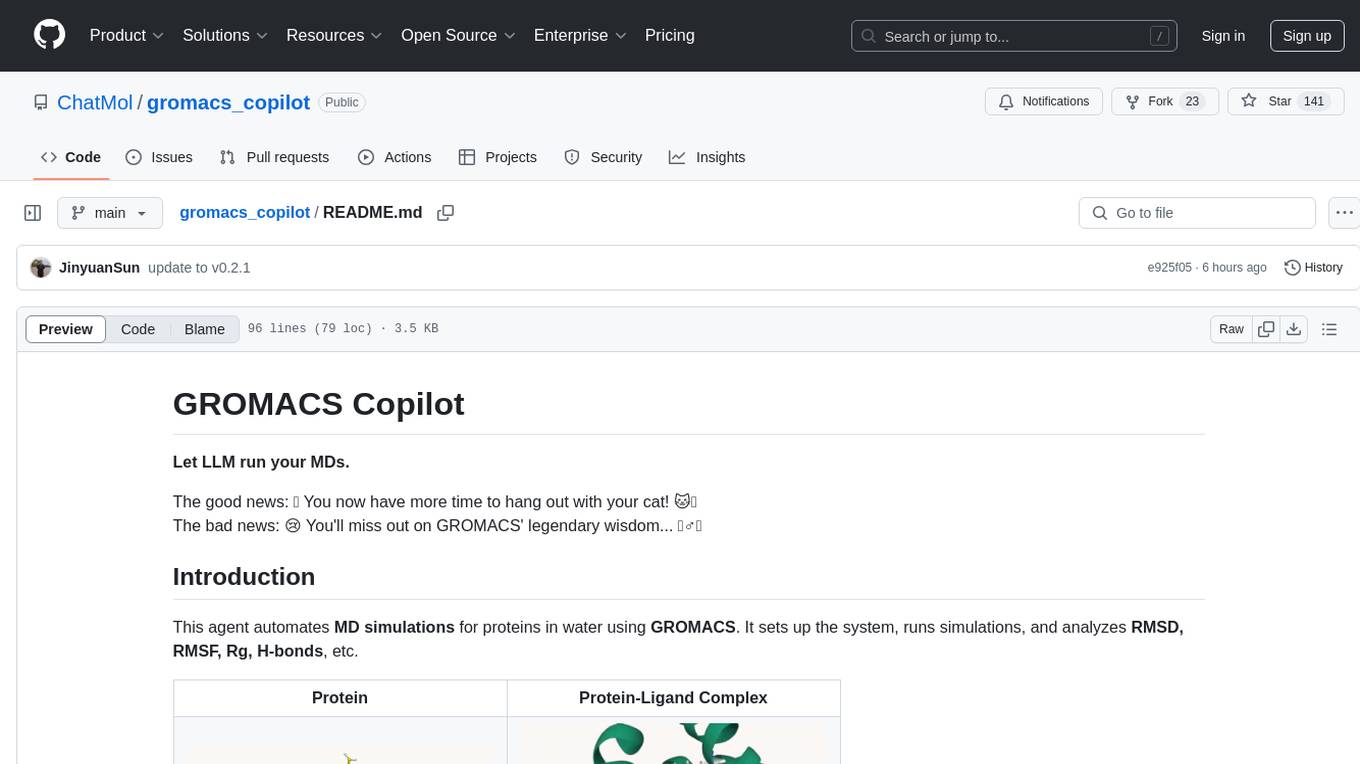
gromacs_copilot
GROMACS Copilot is an agent designed to automate molecular dynamics simulations for proteins in water using GROMACS. It handles system setup, simulation execution, and result analysis automatically, providing outputs such as RMSD, RMSF, Rg, and H-bonds. Users can interact with the agent through prompts and API keys from DeepSeek and OpenAI. The tool aims to simplify the process of running MD simulations, allowing users to focus on other tasks while it handles the technical aspects of the simulations.
12 - OpenAI Gpts
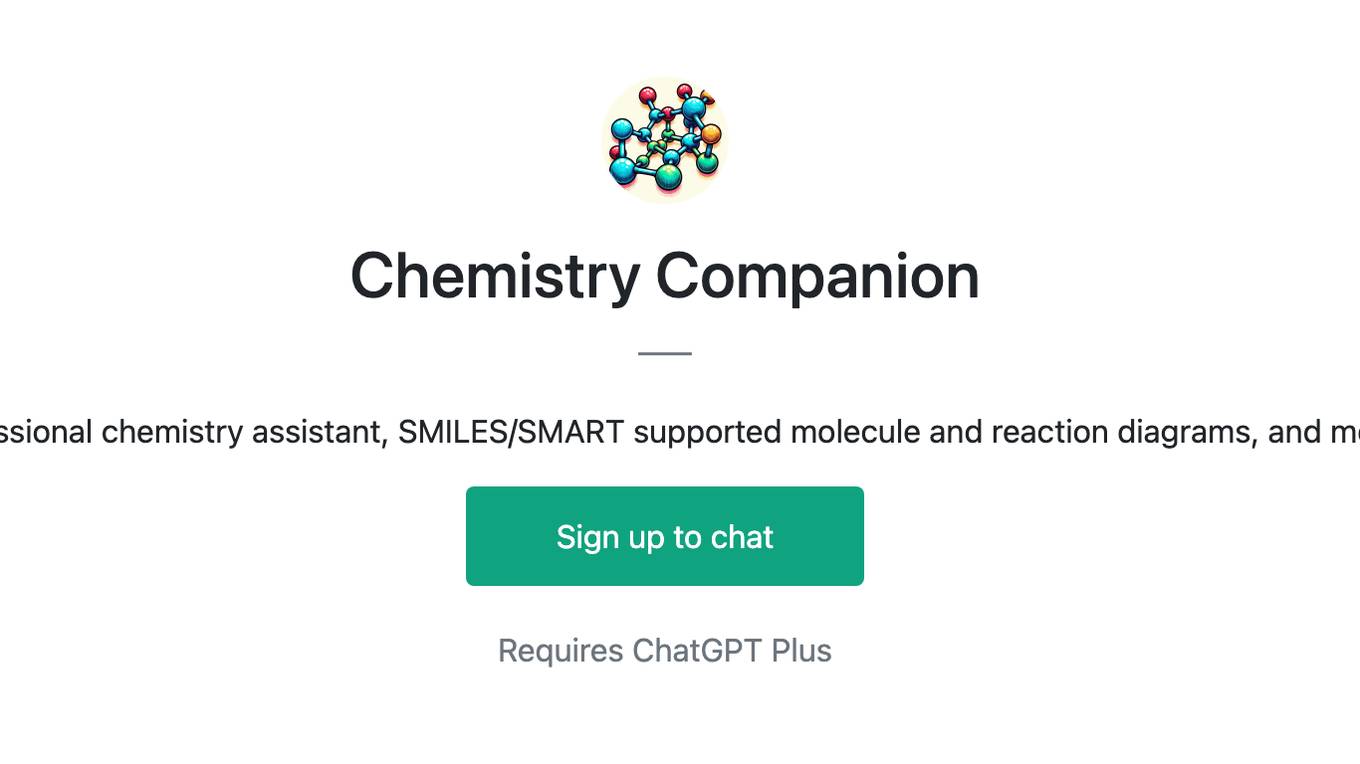
Chemistry Companion
Professional chemistry assistant, SMILES/SMART supported molecule and reaction diagrams, and more!
Electron Configuration "organic chemistry"
A guide to electron configurations with a fun, cartoony approach.
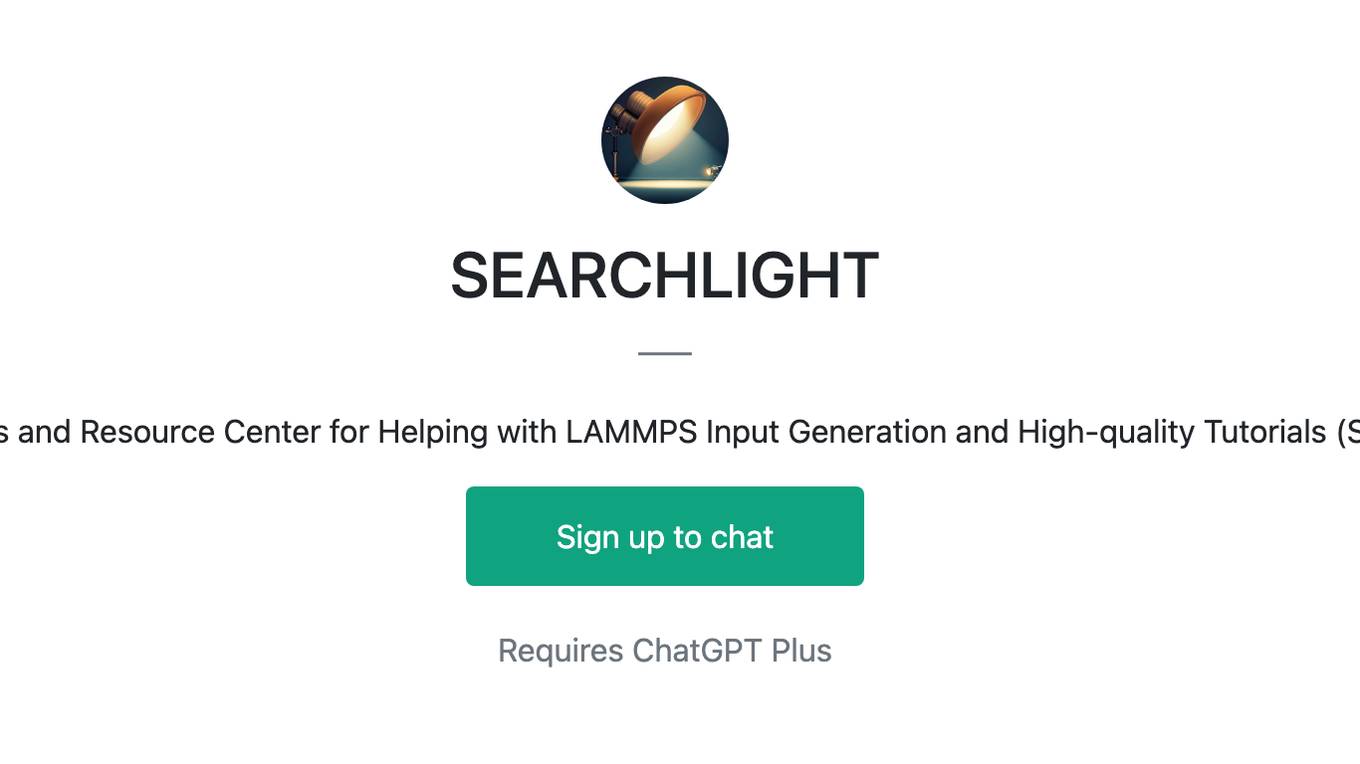
SEARCHLIGHT
Script Examples and Resource Center for Helping with LAMMPS Input Generation and High-quality Tutorials (SERCHLIGHT)
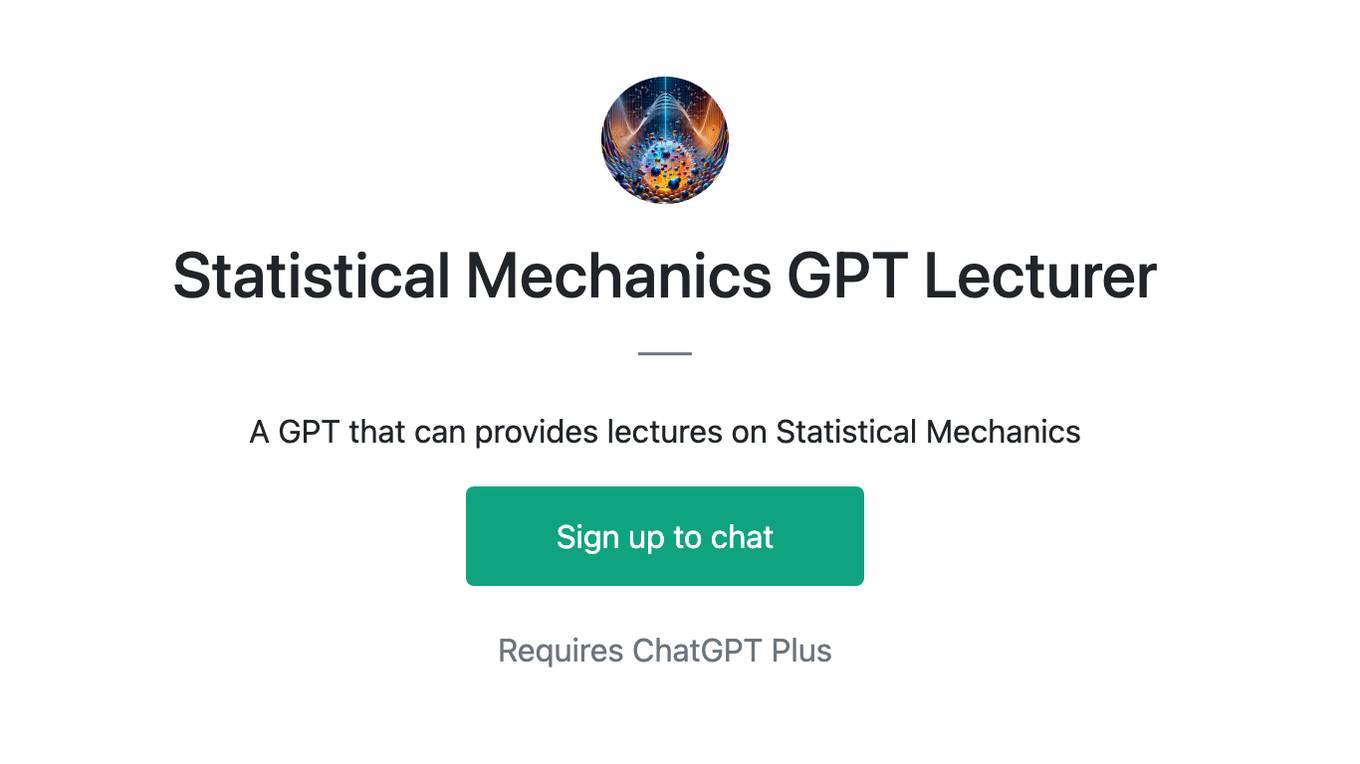
Statistical Mechanics GPT Lecturer
A GPT that can provides lectures on Statistical Mechanics
